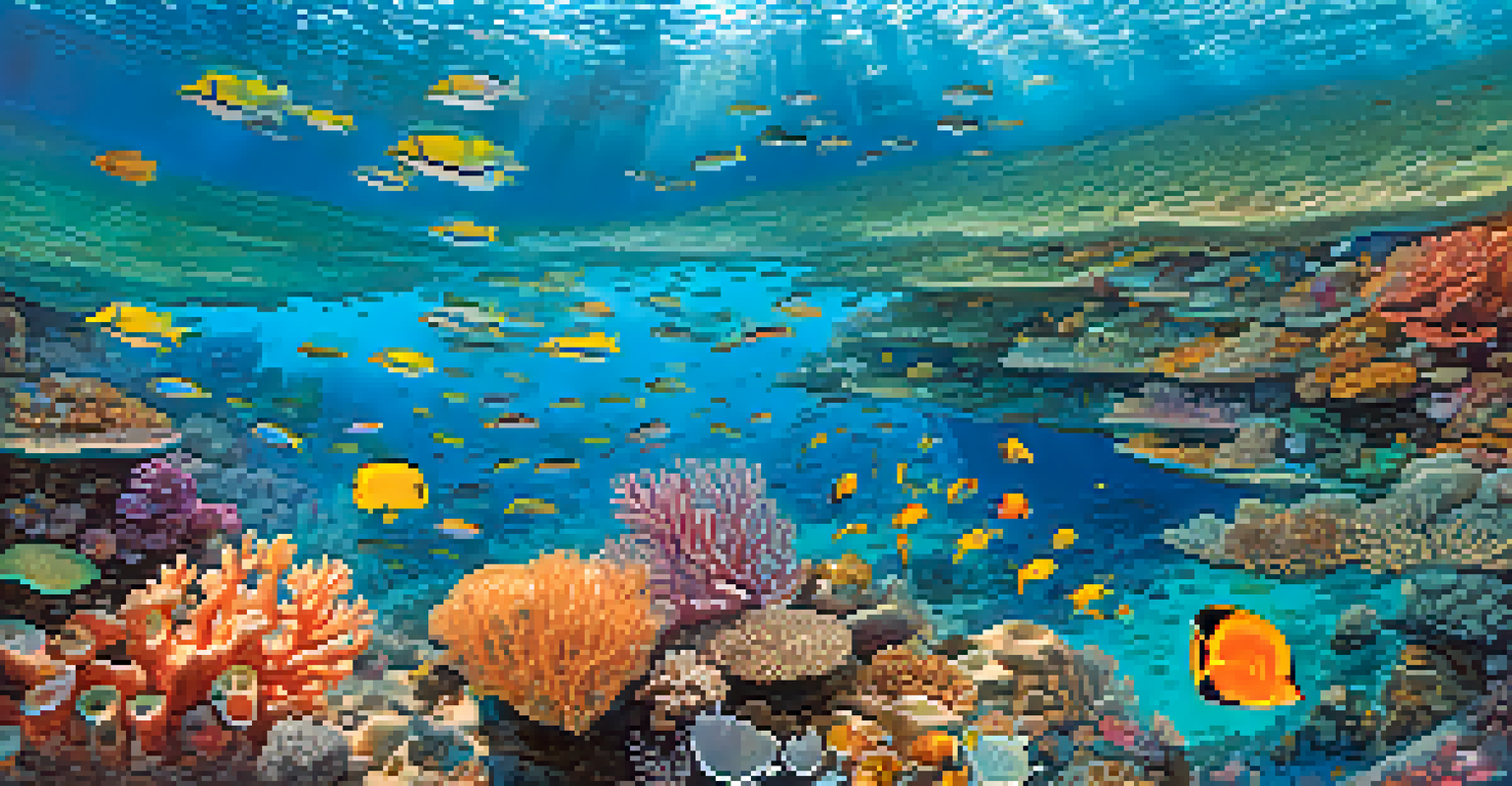Impact of Climate Change on Hawaii's Tourism Industry Growth

Understanding the Basics of Climate Change
Climate change refers to long-term shifts in temperatures and weather patterns, primarily due to human activities. In Hawaii, these changes manifest in rising sea levels, increased temperatures, and altered precipitation patterns. Understanding the science behind climate change is crucial for grasping its impact on various sectors, including tourism.
The climate crisis is a race we can win, but only if we act decisively and quickly.
For example, the coral reefs that surround Hawaii are incredibly sensitive to temperature changes. As ocean temperatures rise, coral bleaching occurs, leading to the degradation of marine ecosystems that attract tourists. This not only affects the beauty of the islands but also the livelihoods of those dependent on tourism.
Thus, grasping the basic concepts of climate change helps us see the larger picture of how environmental shifts directly influence Hawaii's appeal as a travel destination.
Hawaii's Unique Vulnerability to Climate Change
Hawaii’s geographical location makes it particularly susceptible to the effects of climate change. Being surrounded by ocean means rising sea levels threaten coastal areas, which are often the heart of tourism activity. Popular beaches and hotels may face increased flooding, leading to potential closures and costly repairs.

Moreover, the islands experience extreme weather events more frequently, such as hurricanes and heavy rainfall. These events not only disrupt travel plans but can also cause long-term damage to infrastructure vital for tourism.
Climate Change Threatens Tourism
Hawaii's tourism sector faces significant risks from rising sea levels and extreme weather, jeopardizing its economic stability.
As a result, Hawaii's tourism industry must grapple with the reality that its unique beauty and charm are at risk from climate-related changes.
The Economic Impact on Tourism Revenue
Tourism is a cornerstone of Hawaii's economy, contributing billions annually. However, climate change threatens this revenue stream through its impacts on natural attractions and infrastructure. When beaches erode or become unsafe, fewer tourists may visit, resulting in a decline in income for local businesses.
In the face of climate change, we have to make our voices heard and demand that our leaders take action.
For instance, a study found that a significant rise in sea levels could lead to billions in losses for Hawaii's tourism sector. These losses extend beyond just hotels and restaurants, affecting transportation services and local artisans who rely on tourist traffic.
Ultimately, the economic implications of climate change on tourism could ripple through the entire Hawaiian economy, underscoring the need for proactive measures.
Shifts in Tourist Preferences Due to Climate Concerns
As awareness of climate change grows, tourists are increasingly seeking sustainable travel options. This shift in preference means that destinations like Hawaii must adapt to meet the demand for eco-friendly practices. Tourists may favor locations that showcase environmental conservation and responsible tourism.
For example, hotels that implement green initiatives, such as solar energy and waste reduction programs, can attract eco-conscious travelers. This trend presents an opportunity for Hawaii to not only preserve its natural beauty but also enhance its appeal among a growing demographic of responsible travelers.
Sustainability Drives Tourist Choices
As climate awareness grows, travelers increasingly prefer eco-friendly destinations, prompting Hawaii to adapt its tourism practices.
Thus, while climate change presents challenges, it also encourages the tourism industry to innovate and evolve.
Adaptation Strategies for the Tourism Sector
To mitigate the impact of climate change, Hawaii's tourism industry is exploring various adaptation strategies. These can include investing in resilient infrastructure, such as flood-resistant hotels and improved drainage systems. By prioritizing sustainability, the industry can safeguard its future while protecting the environment.
Additionally, local businesses are collaborating with government agencies to develop comprehensive plans that address climate change. Educational programs aimed at both residents and tourists can raise awareness about sustainable practices and promote conservation efforts.
By proactively adapting to climate challenges, Hawaii's tourism sector can not only survive but thrive in a changing world.
The Role of Government and Policy in Tourism
Government policy plays a crucial role in shaping the response to climate change in Hawaii. By implementing regulations focused on sustainability, the state can support the tourism industry while protecting its unique ecosystems. Policies that promote renewable energy and conservation efforts can help mitigate some effects of climate change.
For instance, funding for beach restoration projects and protection of coastal areas can preserve key tourist attractions. Additionally, government support for sustainable tourism initiatives can help local businesses adapt and thrive in the face of climate-related challenges.
Government Policy is Key to Resilience
Strong governmental policies supporting sustainability and conservation are essential for Hawaii to navigate the challenges of climate change.
Thus, strong policy frameworks are essential in guiding Hawaii towards a resilient tourism future amid the realities of climate change.
Looking Ahead: The Future of Hawaii's Tourism
The future of Hawaii's tourism industry hinges on its ability to adapt to climate change while preserving its natural wonders. As environmental conditions evolve, so must the strategies employed by the tourism sector. Emphasizing sustainability and resilience will be key to maintaining Hawaii's allure for future generations.
Moreover, fostering partnerships between local communities, businesses, and government can lead to innovative solutions that benefit both the environment and the economy. For instance, community-led conservation projects can enhance the visitor experience while promoting ecological health.

In conclusion, while climate change presents significant challenges, it also opens the door for Hawaii to redefine its tourism industry in a more sustainable, resilient manner.